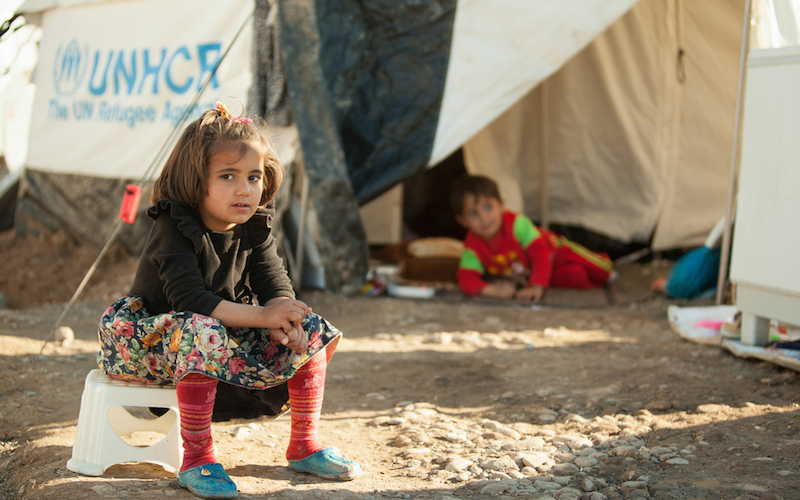
Living in a Tent: What Can We Do About the ‘Deplorable’ Conditions of Refugee Camps?
Today, over 12 million people are displaced due to the ongoing conflict in Syria which is now in its 5th year. Most of Europe is apprehensive about accepting refugees, forcing many to shelter in refugee camps. Refugee camps are jointly administered by governments, UN agencies such as the UN High Commissioner for Refugees (UNHCR) and non-governmental organizations which are tasked with providing necessary services. They act as temporary shelters and hosts for refugees until they are granted asylum in neighboring countries or return to their own country. Shockingly, the refugee shelters have lasted for years, and have become permanent housing rather than temporary settlements.
The conditions of these refugee camps are, to say the least, deplorable. Refugees are forced to live in acute poverty, while vulnerable to diseases and physical abuses. Most of the refugee camps fail to provide adequate food, hygiene and clean water and most of the basic necessities for human survival. There is overcrowding in almost every camp as international aid organizations and other development agencies continue to wrestle with the host countries for finances. This fact is especially evident in the wake of Syrian refugee crisis. People are forced to survive on one meal a day and new born infants are wrapped in plastic instead of warm blankets. It is up to policy makers, UN agencies and international aid organizations to address these issues to ensure the fair and dignified treatment of the refugees.
A look at the past
The world first came to the assistance of refugees in 1921. Since then, the world has witnessed escalated refugee crises. The refugee crisis in the aftermath of Second World War, resulted in over 40 million refugees in Europe alone. Forced displacement of people of such magnitude brought nations together to develop international laws, conventions and organizations to assist refugees. Their initiatives led to the formation of UN Declaration of Human Rights, The Geneva Convention and the UNHCR. These organizations, laws and conventions set the stage for future refugee crisis. Refugee camps have been a symbol of temporary settlements, providing shelter and basic necessities until the crisis is resolved.
Since the refugee camps of today became operational, the conditions have deteriorated, lacking access to clean water, food, and shelter, and are vulnerable to physical abuses, human rights abuses, sexual exploitation and rape. These refugee camps are jointly administrated by the host country, NGOs, and UNHCR and they are responsible for ensuring the safety and security of these refugees. There is an absolute need to for policy makers to address this issue. On many occasions, those responsible for human rights abuses are government soldiers and officials working for the host government. One such example is the genocide in Rwanda and the refugee crisis of 1994. The refugee camps were mostly guarded by government soldiers, giving them complete access to the camp.
History has changed the concept of refugee camps, but the conditions remain terrible. One of the visible changes is the establishment of rules and protocols, however, even after enforcing such strict laws, violation of human rights still exists. Today, many non-governmental organizations, international aid organizations, and government agencies are tasked to ensure safety and security of refugees. However, refugees are not out of danger and these laws have failed to improve the living conditions of many refugees.
Many nations have offered financial assistance, however, the need of the hour is rehabilitation not aid. Many refugee camps including Zaatari (the largest refugee camp in the word), has terrible conditions like overcrowding.
The issue of asylum is consistently debated and security experts offer opinions. In the wake of Syrian refugee crisis, over 4.1 million refugees continue to flee Syria, further straining the refugee camps in and around neighboring countries. It is a moral responsibility for every nation to assist these refugees. In spite of being reluctant to provide asylum, nations are morally obligated to provide adequate infrastructure and basic necessities in the refugee camps. Most refugees want to return home but cannot due to the violence for which they are not responsible.
The two factors that play a crucial role in the escalation of the refugee crisis are overcrowding and inadequate finances. These cannot be resolved without the will of the international community.
Antonio Gutiérrez, the high commissioner of the UNHCR, recently described the UNHCR as “financially broke” as wealthy nations are unable to provide adequate funds thus crippling the administrative abilities of the UN. However, it is impossible to force nations to financially aid these initiatives, hence the UN can only encourage nations to act in the name of humanity.
Overcrowding also needs to be addressed and solutions found. Nations are focused on whether to provide asylum to refugees instead of focusing on their temporary sanctuaries, the conditions in the refugee camps. Many support the idea of granting asylum but nations are not addressing the necessary steps to provide assistance in improving their lives in the refugee camps.

